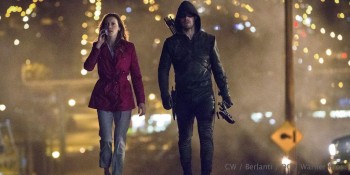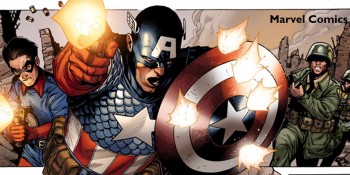Spoiler warning: This column discusses recent plot details for Arrow. Proceed with caution.
With so many television shows on the air to choose from, a series has to be conscientious of its audience and draw viewers in quickly or risk cancelation. However, some shows take a little longer than others to prove they’re worth watching. Last week, I talked about how Marvel’s Agents of S.H.I.E.L.D. didn’t really hit its stride until Captain America: The Winter Soldier completely changed the rules. Another superhero-based show, Arrow, has similarly improved with time.
When Arrow premiered, I never considered not watching it, although I had enjoyed Justin Hartley’s portrayal of Oliver Queen on Smallville and wasn’t looking forward to seeing someone new in the role so soon. When I heard The CW was going with a darker, grittier tone for the series — more like the Christopher Nolan Batman films — I began to get more interested in the show and feel a little more comfortable with a new actor in the role. I was not at all familiar with Stephen Amell when he was cast, so I was curious to see what this version of the Green Arrow story would be like.
Arrow began with Oliver’s rescue from the island where he had been stranded for five years. He was brought home to a mother, sister, and friends who all believed he had died when his father’s yacht sank. After his return to Starling City, Oliver took on the identity of “the Hood,” seeking out corrupted men whom his father had named in a secret journal. The show is also punctuated with flashbacks of Oliver’s time on the island — his transformation into the Oliver Queen of the present day.
While I enjoyed the show from the beginning, I didn’t love it. For one thing, I really hated the use of voiceovers in the early episodes. There’s an art to using a voiceover well, and Arrow just didn’t get that. (See Burn Notice for an example of good voiceover use.) Clearly, Oliver needed someone else on his side to speak to and share his plans with. Thankfully, the powers that be understood this as well, and it wasn’t long before Oliver was forced to take his bodyguard, John Diggle, into his confidence. Almost immediately, the voiceovers ceased, which improved the show greatly.
The flashbacks were another questionable style choice from my perspective. Like voiceovers, there’s an art to properly using flashbacks without making them seem overdone or pointless. While I didn’t love the flashbacks at first, they have grown on me as we’ve seen more of the island where Oliver was marooned. I liked the casting of Manu Bennett as Slade Wilson, one of Oliver’s few allies on the island, and I prefer Sara Lance on the island to her presence in Starling City. The parallels to the present day and the consequences of the choices made on the island are much clearer this season, making the flashbacks themselves much more relevant.
Another improvement came with the addition of Felicity Smoak to Team Arrow. Felicity recurred during the first half of the first season, then discovered Oliver’s true identity around the middle of the year. She quickly became a fan favorite as well as a favored love interest for Oliver. To be honest, there were many times during the first season in which Diggle and Felicity were the main incentive to keep watching the show. I loved those two characters, and while I began to like Oliver more and more, Diggle and Felicity were still my favorites. Even now, I think I like them just a little more than I do Oliver.
The last several episodes of season 1 really began to show how potentially great this series could be, all leading straight from one into the next as a multi-part finale. In the season-ender, the writers raised the stakes even higher by killing Oliver’s best friend, suddenly showing fans that characters on this show aren’t as safe as we think they are.
The momentum from the finale carried over into the second season and set up a complete change in Oliver. In order to honor his friend Tommy’s memory, Oliver changed his methods: he decided he will no longer hunt down the names in his father’s journal and he will not shoot to kill. As much as I hated seeing Colin Donnell leave the series, this was the turning point that pushed the series from, “eh, it’s not bad,” to, “wow, this is really good TV.”
This second season has been a huge improvement over the first. Oliver is now one year removed from the island and has settled into life back home; despite losing his best friend, he has found a renewed purpose in his mission. Ever since the midseason reveal that Slade, the man who taught Oliver to fight and survive on the island, was still alive and plotting against Oliver, the season has improved even more.
The last few episodes have left me on the edge of my seat, and I’m sure many fans are still reeling from Moira Queen’s death two weeks ago in an episode that marked the start of a four-part season finale arc. Honestly, if the writers of Arrow were behind other DC Comics properties, like the new Batman vs. Superman and Justice League films, I’d probably be a lot less worried about how they’re going to turn out.
Arrow still isn’t a perfect show, but it was definitely worth sitting through those voiceovers and other misfires in the stumbling episodes early in season 1. The characters have each evolved over the course of this season, Oliver’s sister Thea in particular. I used to find her merely annoying and spoiled, but she really has really matured a lot from the girl who partied too hard and crashed the brand new car she received for her birthday last year. I only hope this trend continues next season.
My biggest complaint with the show at the moment is that the writers don’t seem to understand that Laurel Lance just doesn’t fit in this show. While the other characters have grown and added depth in season 2, Laurel seems to have remained pretty much static over two seasons — occasionally she takes steps forward only to fall farther back. I’ve tried to like her, and I have nothing against Katie Cassidy, but every scene Laurel is in — except the scenes that feature only Laurel and her sister Sara — just feels awkward and forced. While the show itself continues to raise the stakes and improve on a weekly basis, Laurel is holding it back from becoming really great. I have a feeling Laurel won’t be going away anytime soon, especially if the show wants to follow comic mythology, but I hope writers recognize the failings in her character and start improving the way they write her.
As I mentioned above, the season finale has essentially been a four-part episode, with the third part airing last night. Judging from the suspense of these last three episodes, I can only imagine what the finale has in store. I predict Oliver is going to have to team up with his previous enemy, Malcolm Merlyn (because I won’t believe Thea shot him until I see a body to prove it) in order to get rid of Slade, and I can’t wait to see how that plays out. I’m excited to have John Barrowman back on the show, and I love seeing unlikely allies forced to work together; it always brings out interesting aspects of each character.
I’ve read that the show will shift somewhat in tone again going into season 3, and I can only hope it continues improving as it has this season.
Sure, there are some shows that just aren’t worth your time and you’re better off giving up on them. I probably should have quit on Heroes after season 2, but I just couldn’t let go. (Even worse, I’ll probably check out the new series when it premieres.) And then there are some shows that you will love right from the start, but the network just won’t get behind them. (I’m looking at you Fox: how dare you cancel Almost Human.)
Then there are the shows like Arrow and Agents of S.H.I.E.L.D. that just need a little extra time to live up to their potential. And once they do, you won’t regret a minute you spend watching them.

